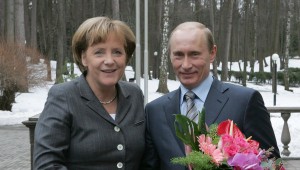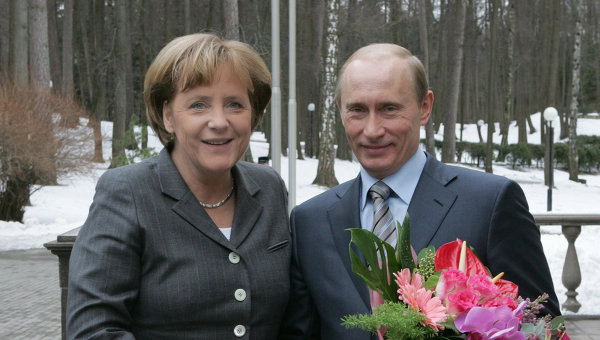via RiaNovosti
 Russian Prime Minister Vladimir Putin is in Germany once again, for a meeting with Chancellor Angela Merkel. His working visit will last two days: November 25-26. The entire European Union (EU) and the rest of Europe are watching this visit particularly closely. This is always the case when Moscow and Berlin are planning to redesign the architecture of Europe. Now Europe is paying additional attention to Putin’s visit because the Euro is ailing and virtually all EU member states are in the grips of the financial crisis while Germany remains the only one in recovery.
Russian Prime Minister Vladimir Putin is in Germany once again, for a meeting with Chancellor Angela Merkel. His working visit will last two days: November 25-26. The entire European Union (EU) and the rest of Europe are watching this visit particularly closely. This is always the case when Moscow and Berlin are planning to redesign the architecture of Europe. Now Europe is paying additional attention to Putin’s visit because the Euro is ailing and virtually all EU member states are in the grips of the financial crisis while Germany remains the only one in recovery.
The agenda for their talks is interesting indeed. Putin and Frau Chancellor will discuss construction work on Nord Stream (half the gas pipeline – 699 km – has been laid to date), the volume of gas supplies to Germany and the EU (France, Denmark and the Netherlands are already discussing an increase), Russia’s accession to the World Trade Organization (WTO), a new EU-Russia partnership treaty and bringing the introduction of visa-free travel forward.
On the eve of his visit, Putin wrote an article for Suedeutsche Zeitung, a major German newspaper known for its liberal economic views.
The text of his article essentially amounts to a new economic manifesto for both Europe and Russia, or even the blueprints of a new economic architecture for the entire Old World. There are two “lead architects” in today’s Russia – last year President Dmitry Medvedev proposed new European security architecture and now Putin has put a plan for new European economic architecture on the table. Importantly, they compliment each other.
These blueprints contain five major points: 1. Forming a harmonious economic community stretching from Lisbon to Vladivostok; 2. A common industrial policy based on the integration of Russia’s and the EU’s technological and resource potentials; 3. Developing equitable and balanced relations between energy suppliers, consumers and transit countries. This is in fact the gist of the new energy treaty that Russia proposed; 4. Putting European science and education in a leading position through close partnership; 5. Eliminating visa requirements as the first step towards the real integration of Russia and the EU, rather than leaving it till last.
This plan is so immense and innovative that it will be some time before Europe embraces it. At any rate, Russia’s vision for how its cooperation with the EU should develop is now clear.
Germany is the most convenient place for introducing these new ideas regarding economic architecture. The stars are aligned in such a way (the financial downturn, Greece, Ireland, Portugal, Spain and Italy all on the brink of bankruptcy) that Merkel is herself mulling this very issue. Only she views it on a purely EU-wide scale rather than as something stretching from Lisbon to Vladivostok. Berlin intends to oversee a strict tightening of financial discipline within the EU. This is no Teutonic whim, it is a dire necessity. Without it the Euro will perish and Berlin may be left to chart its own course: towards Russia and China.




